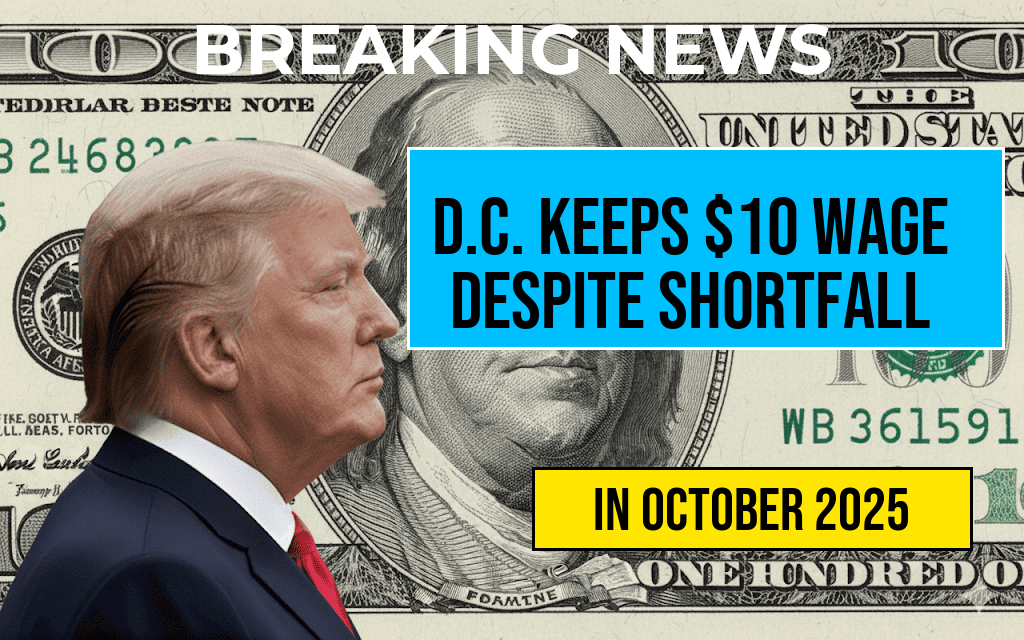Restaurant Wage Debate: D.C. Maintains $10 Base Pay Amidst $4,160 Annual Shortfall Compared to $12 Hourly Rate
The District of Columbia continues to set its minimum wage for restaurant workers at $10 per hour, despite growing industry concerns that this rate leaves employees significantly short of a livable income. Calculations suggest that the current base pay results in an annual shortfall of approximately $4,160 when compared to what workers would earn at a $12 hourly rate—an amount that many advocates argue better reflects the cost of living in the nation’s capital. While the city’s wage policy remains unchanged, restaurant workers and industry leaders are divided over whether the current rate adequately compensates employees, especially as inflation and housing costs escalate.
Amid mounting pressure from labor advocates and some elected officials, D.C. officials have defended the $10 minimum wage, citing economic stability and the city’s commitment to phased increases. However, critics contend that this figure falls short, forcing many restaurant employees to supplement their income through tips or second jobs, which complicates efforts to ensure fair compensation for service workers amid rising living expenses.
Background: Wage Policies and Economic Context
The District’s minimum wage has been a subject of debate for several years, with policymakers gradually increasing the base pay from the federal minimum of $7.25 in 2016 to the current $10. This move was part of a broader initiative to align wages with regional economic realities. According to the Wikipedia entry on U.S. minimum wage laws, many jurisdictions are re-evaluating their thresholds to balance economic growth with fair labor standards.
Despite these efforts, the gap between the current $10/hour wage and an adjusted rate of $12/hour—the figure that some industry analysts suggest is necessary to meet basic expenses—translates into a significant annual shortfall. At $10/hour, a full-time worker clocks in about 2,000 hours annually, earning $20,000 before taxes. Conversely, at $12/hour, earnings would rise to $24,000, creating a $4,000-plus difference, which, when considering taxes and other deductions, roughly equates to an annual shortfall of $4,160.
Impacts on Workers and Industry Dynamics
| Hourly Rate | Annual Gross Income (Full-Time, 2,000 hours) | Estimated Shortfall |
|---|---|---|
| $10 | $20,000 | $4,160 |
| $12 | $24,000 | — |
Many restaurant workers rely heavily on tips, which can vary widely depending on shifts, customer volume, and location. For employees earning $10 an hour, the inconsistency of tip income often exacerbates financial instability, especially as housing costs in D.C. continue to soar. According to the D.C. government’s housing reports, the median rent for a one-bedroom apartment exceeds $2,000 per month, making it increasingly difficult for workers earning the current minimum wage to cover living expenses without additional income sources.
Industry representatives argue that raising wages too rapidly could jeopardize the viability of some small restaurants, especially those already operating on thin margins. “The goal is to find a balance that ensures workers are fairly compensated without forcing businesses to cut hours or shutter,” said a spokesperson for the National Restaurant Association.
Policy and Advocacy Perspectives
Labor advocates maintain that the $10 minimum wage does not reflect the economic realities faced by service workers in the district. They point to data from the Bureau of Labor Statistics, which highlights that the average restaurant worker in D.C. earns less than the city’s living wage estimate of approximately $15 per hour, factoring in rent, transportation, and healthcare costs.
City Council members have debated whether to push for a phased increase to $12 or higher, with some proposing legislation to accelerate wage hikes amid rising inflation. Critics, however, argue that such measures could harm small businesses, especially amid ongoing economic uncertainty. The debate continues as officials weigh the economic benefits of higher wages against potential impacts on employment and affordability.
Looking Ahead: Potential Changes and Challenges
While no immediate legislative changes are scheduled, advocacy groups are intensifying calls for a reevaluation of wage policies. They emphasize that ensuring fair compensation is crucial not only for worker well-being but also for maintaining a vibrant, sustainable restaurant industry in D.C.
As the city’s economy evolves, stakeholders on both sides agree that transparency and data-driven policies are essential. The ongoing wage debate underscores the broader challenge of balancing economic growth with social equity, particularly in a city where the cost of living continues to outpace wage increases for many residents.
For now, restaurant workers in D.C. remain at the current $10 minimum, but the question of whether this rate adequately supports the workforce is unlikely to fade from policy discussions anytime soon. As the city continues to grow and change, so too will the dialogue surrounding fair wages and economic justice.
Frequently Asked Questions
What is the current minimum wage for restaurant workers in D.C.?
The current minimum wage for restaurant workers in D.C. remains at $10 per hour, despite ongoing debates about fair compensation.
How does the current wage compare to what is considered a livable income?
At a $10 hourly rate, restaurant workers in D.C. face an annual shortfall of approximately $4,160 compared to a $12 hourly rate, which many consider necessary for a livable income.
Why is there a debate over increasing the minimum wage for restaurant workers?
The debate centers around ensuring fair wages and economic sustainability for workers, with concerns that the current $10 rate does not adequately cover living expenses in D.C..
What are the implications of maintaining the $10 minimum wage in D.C.?
Maintaining the $10 minimum wage may contribute to ongoing financial hardship for restaurant employees and could impact worker retention and service quality.
Are there any proposals to increase the restaurant wage in D.C.?
While discussions continue, as of now, D.C. has maintained its $10 minimum wage, but there are ongoing debates and advocacy efforts pushing for an increase to better support restaurant workers.

Leave a Reply